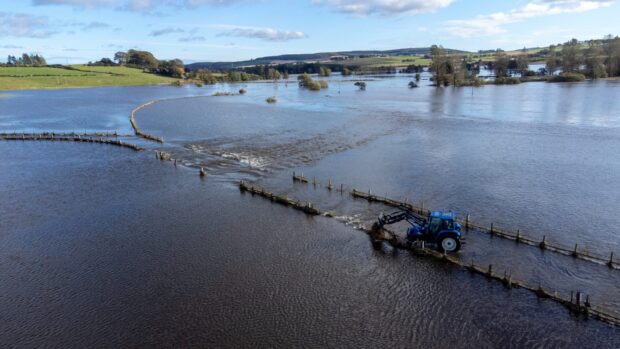Farmers across the north and east of the country have been left counting the costs of the severe flooding which continued over the weekend.
Storm Babet brought more constant heavy rain showers on Saturday which led to multiple roads being closed and several others impassable.
For farmers, they have been left with no option but to watch their newly sown crops or their aftermath of this year’s harvest go under water.
Others have witnessed winter stock feeds of silage and straw bales disappear and many have witnessed the heartache of livestock losses.
Severe flooding results in huge financial burden
Adrian Ivory who is manager of Strathisla Farms, situated between Meigle and Alyth, has endured a horrendous time and described his farmland as a swamp.
He said: “Our annual rainfall is 30 inches but in just the last two days, we have recorded around 5 inches of rainfall.
“The River Isla, which we are next to, rose from 2ft to 12ft in just over five hours.”
Fortunately, the livestock and steading are on higher ground but Mr Ivory says the farm’s 90 acres of newly sown winter wheat is ruined.
“Over the past two weeks, the winter wheat has lay underwater so it’s highly likely that the seed has rotted out. I’m predicting a loss of £10,000 in one field if it has to be drilled again.”
Poultry farmer Matthew Steel from Forfar has spent most of the weekend in his hen laying sheds as 128mm of rain fell from Thursday through to Saturday evening.
£10,000 loss in one field of arable crop
He has 32,000 hens in one shed, with 16,000 each side of a packing station.
As a result of the floods, he has lost 60 hens.
He said: “We worked all through the night with an irrigation pump and tanker to keep on top of the water as the shed ended up being flooded. It has been mucked out with help from local farmers as most of it is done with a shovel.
“The shed is rebedded and now we just have to hope it hasn’t contracted a disease from the flood waters.”
Meanwhile, Angus farmer Alistair Hodnett said he was ”relatively lucky” compared to most but strongly argued that Scottish Environment Protection Agency (SEPA) hadn’t helped the situation of extreme flooding across farmland in the region.
Death of 60 hens in flooded shed
“Every farm in Angus has blocked ditches because we aren’t allowed to disturb the water life,” he said.
“Look at the severe amount of land animals that have been killed last week and this week as a result, let alone the thousands of homes that have been destroyed. Proper water course management is essential – just look at Holland.”
